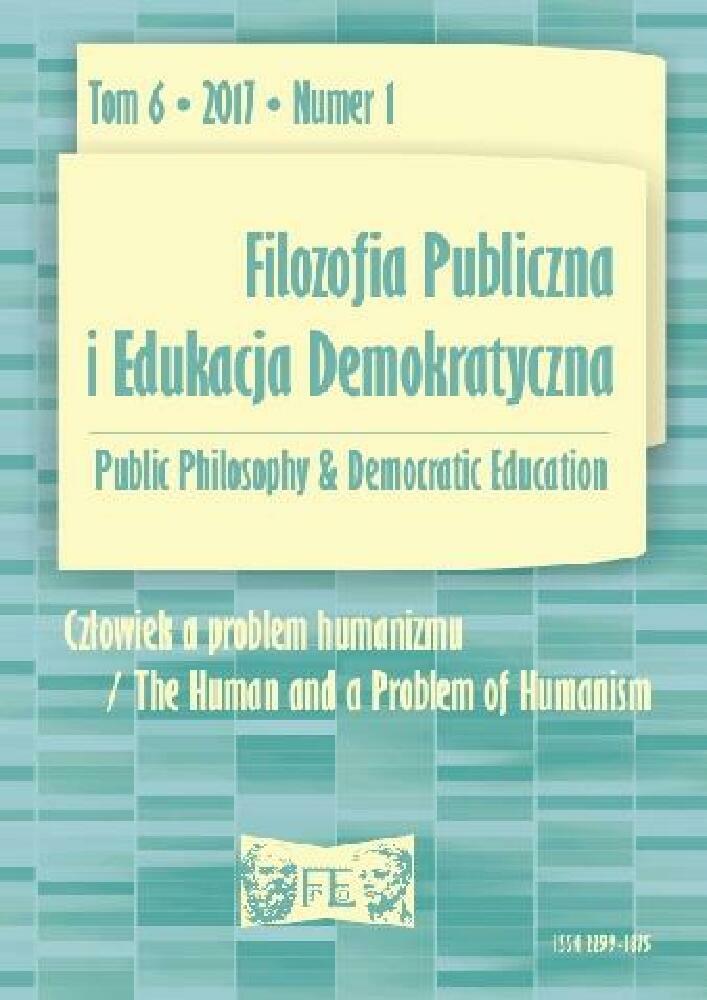Abstract
The consideration of emancipatory and empowering dimension of civic humanism is the chief concern of the article. In the first part there are recalled classical Protagorean sources of European humanism with a special attention to its civic dimension. In the second part I analyse points 3 and 4 of The Amsterdam Declaration 2002 dedicated to the democratic political system. In the last part I propose and develop a thesis that co-participation of citizens in exercising of all three powers in deliberative democratic system – the legislative power (participation in the law-making processes), the executive (participation in creation and realisation of public policies) and the judicial (participation in the system of exercising justice as lay judges) - constitutes the foundation of contemporary humanism as civic activity.References
Cohen, J., „Deliberation and Democratic Legitimacy”, w: A. Hamlin, Ph. Pettit (Eds.), The Good Polity. Normative Analysis of the State, Basil Blackwell, Oxford 1989, ss. 17-34.
Deklaracja amsterdamska z 2002 roku, przeł. D. Ropuszyński, na stronie: http://www.racjonalista.pl/kk.php/s,1231.
Farrar, C., The Origins of Democratic Thought. The Invention of Politics in Classical Athens, Cambridge University Press, Cambridge 1988.
Gajda, J., Sofiści, Wiedza Powszechna, Warszawa 1989.
Gutmann, A. and D. Thompson, Why Deliberative Democracy?, Princeton University Press, Princeton 2004.
International Humanist and Ethical Union, strona internetowa: http://iheu.org/.
Juchacz, P.W., Deliberatywna filozofia publiczna. Analiza instytucji wysłuchania publicznego w Sejmie Rzeczpospolitej Polskiej z perspektywy systemowego podejścia do demokracji deliberatywnej, Wydawnictwo Naukowe IF UAM, Poznań 2015.
Juchacz, P.W., „Trzy tezy o sędziach społecznych i ich udziale w sprawowaniu wymiaru sprawiedliwości w Polsce”, Filozofia Publiczna i Edukacja Demokratyczna, Tom 5 (2016), Nr 1, ss. 155-168.
Kiss, L.W., „Reviving the Criminal Jury in Japan”, in: N. Vidmar (Ed.), World Jury System, Oxford University Press, Oxford 2000, pp. 353-379.
Konstytucja Rzeczpospolitej Polskiej, na stronie: http://www.sejm.gov.pl/prawo/konst/polski/kon1.htm.
Meiksins Wood, E. and N. Wood, Class Ideology and Ancient Political Theory. Socrates, Plato, and Aristotle in Social Context, Basil Blackwell, Oxford 1978.
Norris P., „Introduction: the growth of critical citizens?”, w: P. Norris, Critical Citizens. Global Support for Democratic Government, Oxford University Press, Oxford 1999, ss. 1-27.
Platon, Protagoras, przeł. W. Witwicki, PWN, Warszawa 1958.
Platon, Teajtet, przeł. W. Witwicki, PWN, Warszawa 1959.
Poznański Budżet Obywatelski, na stronie: https://budzet.um.poznan.pl/info/.
Przybylska, A. and A. Siu, „Long Lasting Effects of the First deliberative Poll in Poland”, w: S. Coleman, A. Przybylska, Y. Sintomer (Eds.), Deliberation and democracy: Innovative Processes and Institutions, Peter Lang Edition, Frankfurt am Main 2015, ss. 109-126.
Siemek, M.J., „Logos i polis. Nowoczesność wobec antycznych wzorców społecznego rozumu”, Archiwum Historii Filozofii i Myśli Społecznej, T. 42 (1997), s. 181-194.
The Amsterdam Declaration 2002, na stronie: http://iheu.org/humanism/the-amsterdam-declaration/.
Tocqueville, A., de, O demokracji w Ameryce, przeł. B. Janicka, M. Król, Tom 1, Znak, Kraków 1996.
Vanoverbeke, D., Juries in the Japanese Legal System: The Continuing Struggle for Citizen Participation and Democracy, Routledge, London 2015.
Vernant, J.-P., Źródła myśli greckiej, przeł. J. Szacki, Wydawnictwo słowo / obraz terytoria, Gdańsk 1996.
License
Copyright (c) Authors retain copyright and publishing rights to their articles in this journal, granting the journal the right to distribute them under the terms of the CC BY-NC-ND 4.0

